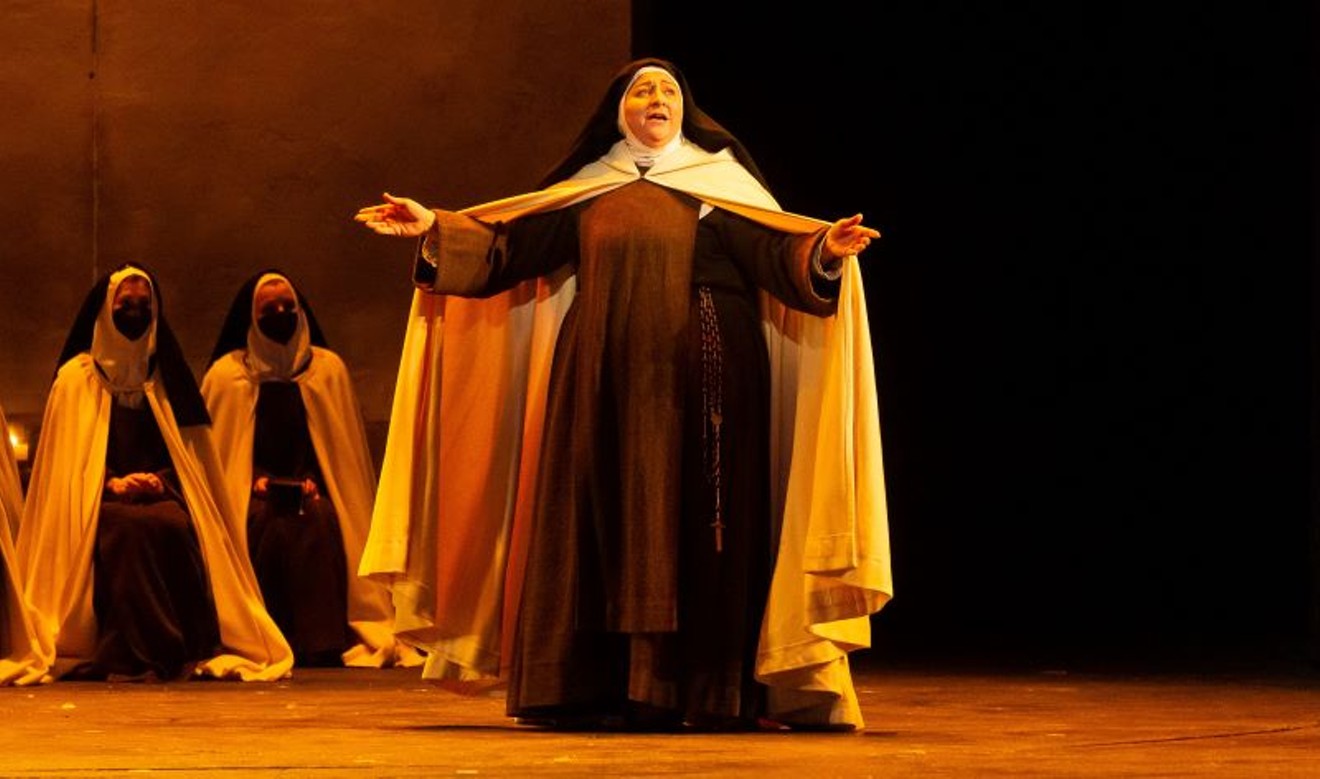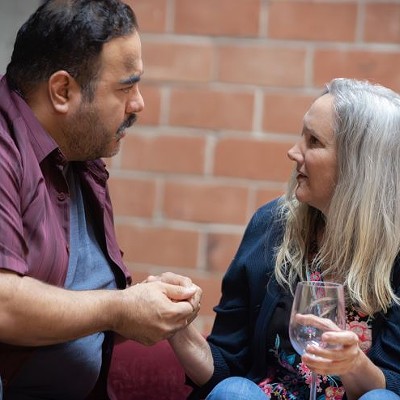Christine Goerke has been to the graves in Paris — the last resting place for the nuns who were beheaded during the French Revolution because, as it turns out, it wasn't only the rich who had much to fear from the revolutionists.
Goerke, the renowned soprano, is back at Houston Grand Opera to sing the role of Madame Lidoine in Dialogues of the Carmelites, the opera by Francis Poulenc based on the real life story of the Carmelite nuns beheaded during the last days of the French Revolution.
"I love this piece it’s heartbreaking. It's an amazing piece in itself because it's really a piece of theater." she says. "It doesn't go well. The spoiler is, it really, really doesn't go well for the nuns."
The story centers on Blanche who comes from an aristocratic family and is terrified that she will be swept up in the chaos and lose her life. She decides to enter a convent, seeing it as a haven. Once there, Blanche is told by the prioress that she has not come to a refuge but rather a house of prayer and has things to do.
Not long after the prioress's death, French officials shut down the convent and expel the sisters. "The people have decided that any organized religion is a danger to the state," Goerke explains. Blanche tries to uphold her commitment but remains terrified at the thought of death. She wants to be true to the nuns and their beliefs, but she is not resolved to the idea of an early death.
Welsh soprano Natalya Romaniw sings the central role of Blanche (who actually is not a historical figure) while Goerke takes on the part of the new prioress, a role she initiated 20 years ago in Japan where this production was first mounted. HGO Artistic and Music Director conducts
"The very first time I sang this role it was over 20 years ago," Goerke says. "When I first sang this and this is the mother superior she is responsible for all her 'children' and all her daughters. But I was not a mother at the time. I am now a mother and my character the woman I am portraying, that lived, she constantly talks about being responsible for her daughters and that she would never throw her children away.
"The hardest part of this for me is to be able to maintain the line between emotionalism and vocalism because if you get too emotional it affects your speaking voice. It's very much the same as far as singing goes. The line has to be walked very, very carefully in this piece because the emotions run very high with the content."
Asked about COVID precautions and fears, Goerke quips: "We are all really living like nuns at the moment. We are going from rehearsal to our homes and that's it." Although being a nun has its perks. "It was chilly in the theater last night. I was thrilled to put my habit on."
Given the events of the last two years with the pandemic, Goerke says Dialogues couldn't be more timely.
"In the last two years I don’t know anyone who hasn’t had to confront fear and death. It's not exactly the same thing. We're not in the middle of the French Revolution. It's a different kind of fear. But we have all experienced this. So it's really quite interesting to be doing this piece in this moment.
"There is this moment of grace at the end of this piece and it's not as much about religion as one would think. The entire piece focuses on how people have relationships with fear, what people are afraid of and what people feel about death."
Francesca Zambello, the international director of opera and theater, directs the HGO production just as she did years ago at the Matsumoto Festival. "She and Pat Racette who is doing the old prioress and myself created this production in Japan when it was brand new. So it's kind of amazing to be able to revisit this with the same people two decades later," Goerke says. "'It was created for the festival and it has been such a simple beautiful production it has stood the test of time."
"To me this is one of the greats," Goerke said. "The music; I am a huge fan of Poulenc. I think it is lyric. I think that it is beautiful. I think that it is lush orchestrally." She says she thinks one of the reasons it is not done that often is because it is difficult to cast. "I think there are a lot of strong voices in this."
"I feel as though everyone would like this. If you go in feeling this is a piece about religion you would be wrong. It's is about history. It's about fear. It's about managing relationships and and your relationship to fear and death and redemption and finding grace in small things. To me that's finding the small beauties in life. And right now we need to find the small beauties in life."
Performances are scheduled for 7 p.m. Friday January 14, 2 p.m. Sunday January 16, and 7:30 p.m. Wednesday January 19 and Saturday January 22 at the Wortham Center, 500 Texas Avenue. Following COVID-19 safety protocols, all audience members will be required to wear a mask covering nose and mouth anytime they are in the building included while seated for a performance. For more information, call 713-228-6737 or visit houstongrandopera.org. $25-$305.
Support Us
Houston's independent source of
local news and culture
account
- Welcome,
Insider - Login
- My Account
- My Newsletters
- Contribute
- Contact Us
- Sign out
HGO's Dialogues of the Carmelites Finds Redemption Amid Fear and Chaos
Margaret Downing January 12, 2022 4:30AM

Christine Goerke (center) in rehearsal for Dialogues of the Carmelites.
Photo by Lynn Lane
[
{
"name": "Related Stories / Support Us Combo",
"component": "11591218",
"insertPoint": "4",
"requiredCountToDisplay": "4"
},{
"name": "Air - Billboard - Inline Content",
"component": "11591214",
"insertPoint": "2/3",
"requiredCountToDisplay": "7"
},{
"name": "R1 - Beta - Mobile Only",
"component": "12287027",
"insertPoint": "8",
"requiredCountToDisplay": "8"
},{
"name": "Air - MediumRectangle - Inline Content - Mobile Display Size 2",
"component": "11591215",
"insertPoint": "12",
"requiredCountToDisplay": "12"
},{
"name": "Air - MediumRectangle - Inline Content - Mobile Display Size 2",
"component": "11591215",
"insertPoint": "4th",
"startingPoint": "16",
"requiredCountToDisplay": "12"
}
]
KEEP THE HOUSTON PRESS FREE...
Since we started the Houston Press, it has been defined as the free, independent voice of Houston, and we'd like to keep it that way. With local media under siege, it's more important than ever for us to rally support behind funding our local journalism. You can help by participating in our "I Support" program, allowing us to keep offering readers access to our incisive coverage of local news, food and culture with no paywalls.
Margaret Downing is the editor-in-chief who oversees the Houston Press newsroom and its online publication. She frequently writes on a wide range of subjects.
Contact:
Margaret Downing
Follow:
Facebook:
HoustonPress
Twitter:
@HoustonPress
Trending Arts & Culture
- Love is in the Alley's Charming Production of Brontë Classic Jane Eyre
- Whose Story is It in The Father at 4th Wall Theatre Co.
- The 10 Best And Most Controversial Hustler Magazine Covers Ever (NSFW)
-
Sponsored Content From: [%sponsoredBy%]
[%title%]

Don't Miss Out
SIGN UP for the latest
arts & culture
news, free stuff and more!
Become a member to support the independent voice of Houston
and help keep the future of the Houston Press FREE
Use of this website constitutes acceptance of our
terms of use,
our cookies policy, and our
privacy policy
The Houston Press may earn a portion of sales from products & services purchased through links on our site from our
affiliate partners.
©2024
Houston Press, LP. All rights reserved.





